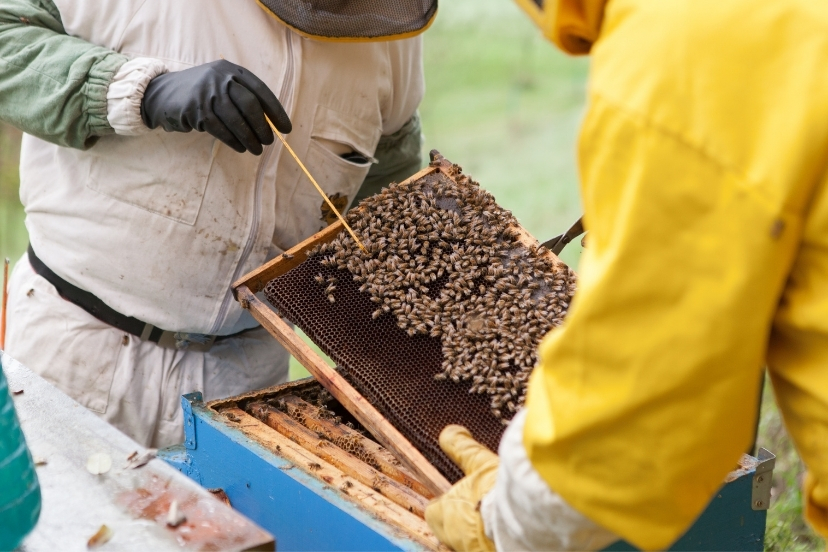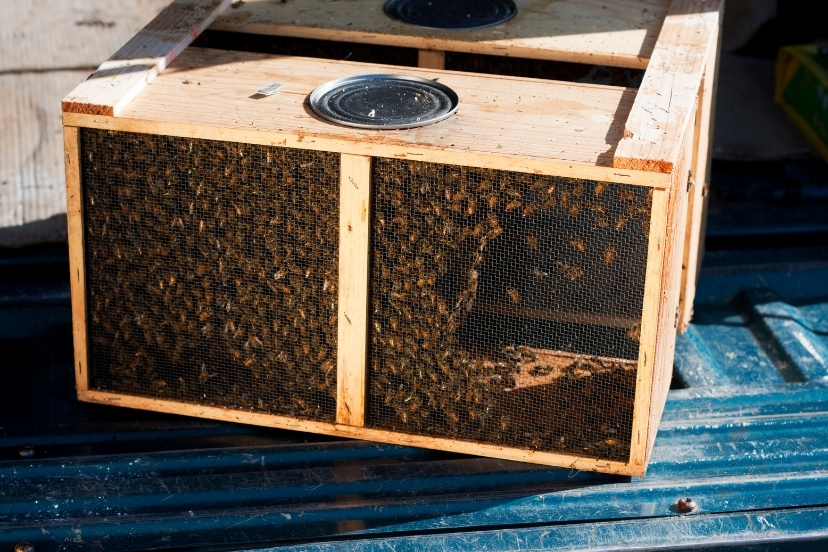Here is a question from one of our readers. What is the age of worker bees in a swarm that leave the hive with a swarming queen?
By Angela.
Hi Angela,
That’s an interesting question.
I’ve read that the bees in a swarm tend to predominately be younger bees, but I’m not sure whether that’s true.
 My guess would be that it’s a fairly even mixture of all ages, excluding very young bees that have just emerged from their cells.
My guess would be that it’s a fairly even mixture of all ages, excluding very young bees that have just emerged from their cells.
There’s a lot about swarms that aren’t fully understood yet. But one thing that we do know for sure about honey bee swarms is that older bees are in charge.
Scout Bees
These older bees are called scout bees, and they have the job of finding a new home for the swarm.
The scout bees decide when the swarm will leave the parent hive, and they decide where the swarm will go. The scout bees also guide the swarm to its new home.
The bees that take up the job of scouting for a new home for the swarm are always bees that were foraging for nectar and pollen before the swarming process began. And foragers are usually the oldest workers in a colony.
Queen Bee
The queen makes no decisions about when to swarm, nor does she have any say in the matter.
In fact, when the bees decide they are going to swarm, they put the queen on a forced diet, because she must lose weight to be able to fly well enough to make the journey to the swarm’s new home.
Swarm Leaves Hive
Then when the time comes for the swarm to leave the hive, the queen is forced to leave the safety of the hive and accompany the swarm to its new home.
One of her daughters will take her place as the queen of the parent colony.
Frequently Asked Questions
What is the average age of worker bees in a swarm?
The average age of worker bees in a swarm is about three weeks. The worker bees in a swarm are the ones that do all the work to keep the hive running.
They build the comb, care for the eggs and larvae, and collect the honey.
They also protect the hive from predators and keep the hive clean. The worker bees in a swarm are the ones that wear themselves out and die after a few weeks.
How does the age affect the swarm’s ability to forage and gather food?
The worker bees in a beehive are responsible for a variety of tasks, including foraging for food and gathering nectar and pollen to bring back to the hive.
The age of the worker bees can have a significant impact on the swarm’s ability to forage and gather food.
Younger worker bees are typically more active and have more energy than older bees.
How does the age affect the swarm’s ability to defend itself against predators?
The age of worker bees affects the swarm’s ability to defend itself against predators in a few ways.
First, younger bees are generally more active and agile, and thus better able to defend the hive from predators.
Second, younger bees have not yet reached their full size and strength, and thus can be easily overpowered by larger predators.
Third, younger bees have not yet developed the full range of defensive behaviors that older bees have, and thus may be more likely to fall victim to a predator.
How does the age affect the swarm’s ability to reproduce?
As worker bees age, they gradually lose the ability to effectively reproduce.
This is due to a number of factors, including a decline in the number of eggs they produce, a decrease in the quality of the eggs they produce, and a decrease in the number of sperm they produce.
Additionally, older worker bees are less able to care for the young, which can lead to a higher mortality rate among the swarm.
How does the age of worker bees affect the swarm’s overall health and vitality?
The age of worker bees affects the swarm’s overall health and vitality in a few ways.
First, younger bees are generally more active and have an easier time flying than older bees. This means that they can cover more ground in search of food, and they can also bring more food back to the hive.
This increased activity level can help the swarm to build up its stores more quickly, and it can also help to keep the hive clean.
What is the maximum age of worker bees in a swarm?
The maximum age of worker bees in a swarm is about six weeks. After that, they will begin to die off, and the swarm will gradually dwindle in size.
What happens to worker bees when they reach the maximum age?
When worker bees reach the maximum age, they are no longer able to fly and their wings start to break off.
They become known as “house bees” and their only job is to take care of the hive.
They clean the hive, feed the larvae, and make sure the queen bee is healthy.
What are the consequences of having too many or too few young worker bees in a swarm?
If a bee colony has too few young worker bees, it will not be able to function properly. The colony will be unable to gather enough food and will not be able to care for the brood properly. The colony will eventually die off.
If a bee colony has too many young worker bees, the colony will be very productive. However, the bees will be very stressed and will not live as long as they would if the colony was of a normal size.
Is there anything that can be done to prolong the life of worker bees in a swarm?
Yes, there are a few things that can be done to prolong the life of worker bees in a swarm.
One is to provide them with plenty of food and water.
Another is to make sure that the hive is clean and free of disease.
Finally, it is important to keep the bees from getting too stressed out.
How To Count The Number On Workers in A Swarm
The age of worker bees in a swarm can be determined by looking at the bees in the swarm and counting the number of bees that are young and the number of bees that are old.
The ratio of young bees to old bees will give you the age of the worker bees in the swarm.
How long do workers live in a swarm?
The lifespan of a worker in a swarm can vary depending on a number of factors, but typically, they live for around six weeks.
After a worker bee emerges from her cell, she will spend the first few days of her life cleaning it out and preparing it for the next generation of bees.
he will then begin working in the hive, performing a variety of tasks such as collecting nectar and pollen, building wax comb, and caring for the larvae.
What factors influence the age of worker bees in a swarm?
There are many factors that influence the age of worker bees in a swarm.
The most important factor is the time of year. Worker bees are born in the spring and live for about six weeks.
They spend the first three weeks of their lives in the hive, where they are fed by the queen and her attendants.
During this time, they develop their wax glands and learn how to build honeycomb. They also learn how to clean the hive and care for the queen.


